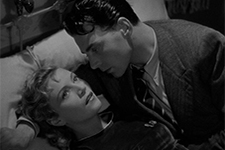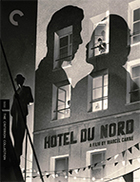Hôtel du Nord
|  Marcel Carné’s Hôtel du Nord is set against the backdrop of an actual location—the titular hotel—which is situated along the banks of the Canal Saint-Martin in a working-class district in Paris. However, the film was shot entirely on sets recreating the hotel and its immediate environs, thus lending it a curious air of slight unreality. The sets, by production designer Alexandre Trauner (who collaborated with Carné on 11 films between 1935 and 1951), are exquisite in their scope and detail, to the point that, if you didn’t know differently, you would assume it was shot on location. But, there is something not quite right. Everything is just a bit too perfect, too designed, to be reality, even if there is no one thing you can put your finger on. That ambiguity of illusion is key to the film’s effectiveness and why it rises above its relatively pedantic melodramatic narratives. Scripted by the prolific Jean Aurenche with dialogue by journalist-screenwriter Henri Jeanson from a celebrated novel by Eugène Dabit, Hôtel du Nord tells the interlocking stories of two very different couples staying at the titular hotel. The first couple consists of naïve young lovers, Renée (Annabella) and Pierre (Jean-Pierre Aumont), who, despite being deeply in love, have decided to kill themselves because they can’t succeed in a hard world. Their plan is for Pierre to shoot Renée in the heart first and then shoot himself, but he loses his nerve after shooting her and runs away, only to turn himself into the police the next day, whereupon he discovers that Renée has survived. Ashamed of both his failure and his cowardice, he submits to a prison sentence and tries to drive her away despite her forgiveness. The second couple consists of a pimp, Monsieur Edmond (Louis Jouvet), and the prostitute who works for him, Raymonde (Arletty). It is Edmond who hears the shot when Pierre attempts to kill Renée, and he ends up falling in love with her after she moves into the hotel and is offered a job there by the sympathetic owners. This requires that Edmond leave Raymonde despite a promise that they would move to the Riviera to escape a pair of criminals who have discovered his whereabouts and want to kill him to avenge an earlier conflict. In these intersecting lives we see all manner of stark contrast—between Renée’s simple, angelic beauty and Raymonde’s world-weary sarcasm, between Pierre’s tragic self-loathing and Edmond’s morose resignation, between the jauntiness of the dialogue and the social entrapment the characters face due to poverty and criminal pasts—which Carné underscores with his trademark atmospherics. Hôtel du Nord was the middle part of a loose trilogy of films Carné directed in the late 1930s, the others being Port of Shadows (1938), a drama about an army deserter, and Le jour se lève (1939), which is about a murderer who locks himself in his apartment and ruminates on his past. Hôtel du Nord is certainly the “lightest” of the three and the only one to not star Jean Gabin, whose great, tragic aura was so central to so many masterpieces of French cinema in the ’30s and ’40s. But, even then the film bears a heavy burden of social constriction and fatality, with its characters struggling through trial after trial in attempting to reach some form of contentment. None of the characters seems comfortable in their own skin, with the exception of Raymonde, who the great Aretty (one of Carné’s most frequent on-screen collaborators) turns into a genuinely provocative and engaging character whose mixture of desperation and self-assertiveness makes her instantly memorable. By comparison, Reneé and Pierre, who are ostensibly the film’s heart and soul, are rather bland—generic stand-ins for tragic innocence, beauty, and (perhaps) fool-hearty belief in some kind of happily-ever-after. The fact that the film radically alters the novel’s despondent ending into something upbeat and optimistic is indicative of Carné’s aims. Shot by Louis Née and Armand Thirard (who worked together on dozens of films with directors like Julien Duvivier, Henri-Georges Clouzot, and Roger Vadim), Hôtel du Nord embodies many of the elements of French poetic realism, although the more stylized touches tend to be scattered about, which much of the film playing in relatively straight-forward fashion. One of the most memorable images involves Pierre, distraught over his inability to kill himself after shooting Renée, standing at the edge of a bridge, emerging from a mist that feels like it blew in from someone’s dream (or nightmare). The slight unreality of the sets and the expressive photography gives much of the film a bit of a dreamlike edge, which works because the narrative is, quite frankly, pretty preposterous. The fact that story and style merge as well as they do helps the film along its course, and while it doesn’t rank with Carné’s truly great works, it stands out in its own right.
Copyright © 2022 James Kendrick Thoughts? E-mail James Kendrick All images copyright © The Criterion Collection | |||||||||||||||||||||||||||||
Overall Rating: 

 (3)
(3)


